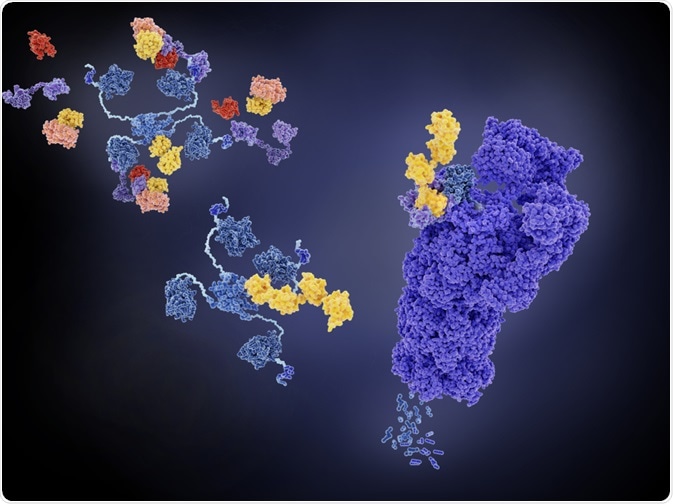Parkin is an enzyme involved in proteolysis in human cells. Autosomal recessive mutations in the PARK2 gene, which encodes this protein, are known to cause early-onset Parkinson's disease.
 Image Credit: Juan Gaertner / Shutterstock.com
Image Credit: Juan Gaertner / Shutterstock.com
Researchers use the anti-Parkin antibody in scientific studies, aiming to learn more about the onset and progression of Parkinson's disease and autosomal recessive juvenile Parkinson's disease. The antibody is also being used to explore potential therapies for the disease. Aside from Parkinson's disease, researchers have been using the anti-Parkin antibody to further our understanding of some cancers as well as leprosy.
What is Parkin?
The function of Parkin is yet to be fully elucidated. However, scientists have uncovered that the encoded protein of this human gene is essential to the multiprotein E3 ubiquitin ligase complex, known for its function in proteasomal degradation.
Research has concluded that Parkinson's disease and autosomal recessive juvenile Parkinson's disease are linked with mutations in the PARK2 gene, leading it to be considered a causal factor in the onset of these diseases. Therefore, research into how this gene influences both these diseases has been a key area of study.
Applications of the anti-Parkin antibody in research
There are numerous applications of the anti-Parkin antibody in scientific research, mostly surrounding the study of Parkinson's disease and autosomal recessive juvenile Parkinson disease, but also in looking at certain cancers as well as leprosy. Below, the impact of how anti-Parkin antibodies are used in these distinct fields of research is discussed.
Parkinson's disease
While scientists still need to fully explore the role that the anti-Parkin antibody plays in Parkinson's disease, they have been able to identify that disruption to this gene could lead to pathological consequences.
Research into how the anti-Parkin antibody influences the pathology of Parkinson's disease, and its interaction with other biological factors, is proving essential to gaining an understanding of how Parkinson's disease begins and progresses and allows the investigation of new therapeutic avenues.
Researchers are using the anti-Parkin antibody to investigate the workings of the E3 ubiquitin ligase complex and how it influences Parkinson's disease. As a component of the multiprotein complex, mutations in the Parkin protein have the potential to disrupt the function of this complex, which has been linked with the death of dopaminergic neurons and the onset of Parkinson's disease. E3 ubiquitin ligase has also been linked with the formation of Lewy bodies, a pathological trademark of Parkinson's.
Mutations in the anti-Parkin antibody have been found to be more common than those of other related genes in those with early-onset Parkinson's disease. In addition, scientists have discovered heterozygous deletions of the antibody in those with early-onset Parkinson's disease.
Researchers have shown that oxidative stress may play a role in initiating mutations in this particular gene. This highlights the significance of the gene in the etiology of the disease.
Work continues to uncover the fine details on how the anti-Parkin antibody leads to Parkinson's disease. It is proving to be an invaluable font of information in understanding the disease, which should theoretically lead to the exploration of new, better therapies.
Given that there is currently no cure for Parkinson's disease and that current therapies only work to alleviate symptoms, research involving the anti-Parkin antibody is significant in that it could be developed to improve the quality of life of patients diagnosed with both Parkinson's disease and autosomal recessive juvenile Parkinson disease.
Cancer
Research studies using the anti-Parkin antibody have also been fundamental in developing our understanding of several types of cancer. Studies have shown that somatic mutations to the PARK2 gene are related to glioblastoma and other malignancies. Deletions in this gene are also commonly observed in sporadic colorectal cancer in mice. Furthermore, these deletions have been suggested to accelerate adenoma development.
Mutation in the PARK2 gene has been associated with lung cancer. These findings have indicated the role of the Parkin protein as a tumor suppressor. Thus, research involving the anti-Parkin antibody in the context of cancer is enabling scientists to consider new forms of therapy.
Leprosy
Leprosy has long been suspected of having a genetic component, and after extensive research, mutations within the PARK2 and PACRG genes linked with increased susceptibility to developing the condition. Since this discovery, further studies looking into the role of the PARK2 gene in leprosy have given an insight into the biological mechanisms behind the increase in susceptibility and provided opportunities for drug development.
Opening the door to potential new treatments
Research involving the anti-Parkin antibody has been crucial to both understanding Parkinson's disease, certain cancers, and leprosy, as well as providing new avenues for therapeutic and prophylactic drug development.
Further Reading
 Researchers show the effect of SARS-CoV-2 infection on somatosensory abnormalities in a hamster model
Researchers show the effect of SARS-CoV-2 infection on somatosensory abnormalities in a hamster model